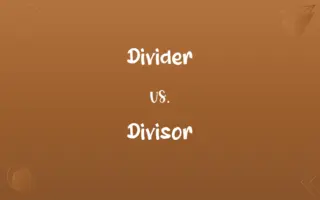Equitable vs. Fair: Know the Difference

By Shumaila Saeed & Dua Fatima || Updated on March 3, 2024
Equitable treatment involves adjusting resources and opportunities to address individuals' specific needs, while fairness often implies equal treatment and opportunities for all, regardless of differences.

Key Differences
Equitable treatment recognizes and addresses the different circumstances and needs of individuals, aiming to provide resources and opportunities tailored to ensure everyone can achieve an equal outcome. Fairness, in contrast, focuses on treating everyone the same way, providing equal opportunities and resources across the board, without considering individual differences or needs.
Shumaila Saeed
Mar 03, 2024
While equity seeks to level the playing field by considering disparities and barriers that people face, fairness operates on the principle of sameness, potentially overlooking the unique challenges some individuals may encounter. Equitable approaches might provide more support to those who start at a disadvantage, whereas fairness ensures that the rules and resources are distributed uniformly, regardless of one's starting point.
Dua Fatima
Mar 03, 2024
In education, for example, equity might involve providing additional tutoring to students from underprivileged backgrounds, recognizing their need for extra support to achieve the same educational outcomes as their peers. Fairness, on the other hand, would ensure all students receive the same amount of tutoring and resources, regardless of their background or individual challenges.
Shumaila Saeed
Mar 03, 2024
The concept of equity is often applied in social justice contexts, where it aims to correct systemic inequalities by allocating resources and opportunities based on individuals' needs. Fairness, however, is a broader concept that can be applied in various contexts, emphasizing impartiality and the absence of bias in decision-making and resource distribution.
Dua Fatima
Mar 03, 2024
Both equity and fairness strive to achieve justice and equality, but they approach these goals from different perspectives. Equity focuses on outcomes and the means to achieve them, considering individual needs and circumstances, while fairness emphasizes uniform treatment and equal opportunities for everyone, without differentiation.
Hifza Nasir
Mar 03, 2024
ADVERTISEMENT
Comparison Chart
Definition
Adjusting support based on individual needs to ensure equal outcomes.
Treating everyone the same, regardless of their differences.
Dua Fatima
Mar 03, 2024
Application
Often used in social justice to address systemic inequalities.
Applied broadly, emphasizing impartiality and equal opportunities.
Shumaila Saeed
Mar 03, 2024
Example
Providing extra tutoring to students who need it.
Giving all students the same amount of tutoring resources.
Shumaila Saeed
Mar 03, 2024
Goal
To level the playing field by considering individual circumstances.
To ensure impartiality and equal treatment across the board.
Hifza Nasir
Mar 03, 2024
ADVERTISEMENT
Equitable and Fair Definitions
Equitable
Needs-based allocation.
Equitable healthcare means more resources are directed to communities with higher health risks.
Shumaila Saeed
Mar 03, 2024
Fair
Uniform opportunities.
Offering every student the same educational resources exemplifies fairness.
Shumaila Saeed
Mar 03, 2024
Equitable
Social justice principle.
Equity in legal representation ensures that everyone, regardless of income, has access to competent counsel.
Shumaila Saeed
Mar 03, 2024
Fair
Equal treatment.
A fair competition means the same rules apply to all participants.
Shumaila Saeed
Mar 03, 2024
Equitable
Tailored support.
Offering scholarships specifically to students from low-income families is an example of equitable treatment.
Hifza Nasir
Mar 03, 2024
ADVERTISEMENT
Fair
Process-oriented.
Ensuring a fair trial involves following due legal processes without prejudice.
Shumaila Saeed
Mar 03, 2024
Equitable
Outcome-focused.
Equitable employment practices involve initiatives to close the gender pay gap.
Hifza Nasir
Mar 03, 2024
Fair
Impartiality.
Fair hiring practices involve selecting candidates based on merit alone.
Dua Fatima
Mar 03, 2024
Equitable
Correcting imbalances.
Implementing flexible work hours for parents is an equitable policy.
Dua Fatima
Mar 03, 2024
Fair
Justice concept.
A fair tax system imposes the same rate on everyone, irrespective of their earnings.
Dua Fatima
Mar 03, 2024
Equitable
Possessing or exhibiting equity; according to natural right or natural justice; marked by a due consideration for what is fair, unbiased, or impartial; just; as, an equitable decision; an equitable distribution of an estate; equitable men.
No two . . . had exactly the same notion of what was equitable.
Shumaila Saeed
Oct 19, 2023
Equitable
Implying justice dictated by reason, conscience, and a natural sense of what is fair to all;
Equitable treatment of all citizens
An equitable distribution of gifts among the children
Shumaila Saeed
Oct 19, 2023
Repeatedly Asked Queries
Why is equity important in education?
Equity in education is important to address disparities and ensure all students, regardless of background, have the support they need to succeed equally.
Dua Fatima
Mar 03, 2024
Can a policy be both fair and equitable?
A policy can aim to be both fair and equitable by combining uniform rules with adjustments for individual needs, but achieving both perfectly can be challenging due to their differing focuses.
Shumaila Saeed
Mar 03, 2024
What does fair mean?
Fair means treating everyone the same way, providing equal opportunities and resources to all, without consideration for individual differences.
Shumaila Saeed
Mar 03, 2024
How can equity address social inequalities?
Equity addresses social inequalities by allocating resources and opportunities based on individual needs, aiming to correct imbalances and systemic injustices.
Shumaila Saeed
Mar 03, 2024
How do fairness and equity relate to justice?
Both fairness and equity are concepts related to justice, aiming to achieve fair treatment and equal opportunities for all, though they approach these goals through different means.
Dua Fatima
Mar 03, 2024
What does equitable mean?
Equitable means adjusting resources and opportunities to meet individual needs, aiming for equal outcomes for everyone.
Dua Fatima
Mar 03, 2024
How do equitable and fair treatments differ?
Equitable treatment focuses on tailoring resources to achieve equal outcomes, while fair treatment emphasizes equal opportunities and uniform application of rules.
Shumaila Saeed
Mar 03, 2024
Can focusing on fairness overlook individual needs?
Yes, focusing exclusively on fairness can overlook individual needs, as it may not account for varying starting points or barriers faced by different people.
Shumaila Saeed
Mar 03, 2024
How can a workplace promote equity?
A workplace can promote equity by implementing policies that recognize and support the diverse needs of its employees, such as flexible working hours for parents.
Shumaila Saeed
Mar 03, 2024
What role does fairness play in the justice system?
In the justice system, fairness is crucial for ensuring that all individuals are treated equally under the law, with impartiality in proceedings and decisions.
Hifza Nasir
Mar 03, 2024
What is an example of a fair policy?
A fair policy might be one that applies the same rules to everyone in a community, such as a uniform speed limit for all drivers.
Hifza Nasir
Mar 03, 2024
Is fairness always equitable?
Fairness is not always equitable because treating everyone the same can fail to address underlying disparities and barriers some individuals face.
Hifza Nasir
Mar 03, 2024
Why might an equitable approach be preferred in certain situations?
An equitable approach might be preferred in situations where there are significant disparities, as it seeks to provide targeted support where it is most needed to achieve fairness in outcomes.
Shumaila Saeed
Mar 03, 2024
What is a challenge in applying equitable principles?
A challenge in applying equitable principles is accurately identifying and addressing the specific needs of individuals or groups to ensure truly equal outcomes.
Hifza Nasir
Mar 03, 2024
How can society balance fairness and equity?
Society can balance fairness and equity by ensuring that policies and practices not only apply rules uniformly but also account for and address individual and group disparities.
Hifza Nasir
Mar 03, 2024
Share this page
Link for your blog / website
HTML
Link to share via messenger
About Author
Written by
Shumaila SaeedShumaila Saeed, an expert content creator with 6 years of experience, specializes in distilling complex topics into easily digestible comparisons, shining a light on the nuances that both inform and educate readers with clarity and accuracy.
Co-written by
Dua Fatima






























































